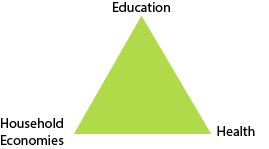Education, Household Economies and Health remain the tripod upon which individual and societal progression is pegged. The focus of this write-up is on education.
Education substitutes a closed mind with an open one. At the pre-primary level, the infant learns the value of trust from the primary caregiver. As this gets formulated, the child also learns to sit, to stand and even to walk. A few sounds are also practiced, culminating in words.
Amidst this, toiletry skills are acquired. The earlier acquired instinctive skill of crying in search of attention, is gradually substituted by other forms of communication.
Still in this period before joining primary education, the child’s toiletry and language skills are further developed. The trust is extended to the child’s play mates and to the teachers. Basic innovations also start. This child learns how to help in the dressing up, in the self-bathing, and in basic washing. With this, some sense of responsibility-taking is inculcated. Also, there is some logical connection: my mother will escort me to school, leave me there with my playmates, in the care of my teachers. Later, she will come back for me.
The more the child remains in school throughout primary, and the more they interact with their peers and other adults, the more they learn different forms of relating. Gradually they know how to fight their fights and settle their disputes. Depending on the interactions with adults, and the used reinforcement or deterrent measures, actions are encouraged or discouraged. This leads to behavior and the subsequent behavior formation.
Later, at upper primary and lower secondary the child starts coming face to face with adolescence. A guided understanding of one’s physiognomy is critical. Also the emotional and psychological changes call for guidance.
Socially, the adolescent questions the earlier “good boy/ good girl” tag, leaving parents and guardians labelling the growing mind . Often the labels are not so kind. While it is true that some may start engaging in unwanted and antisocial behavior, the way the guardians communicate this, many a times slamming them with blanket accusations and generalizations, worsens the situation. Instead of helping to clear the confusion that is in the young mind, more cryptic questions are raised.
Throughout this time, the youth is meant to concentrate on their formal education. Through this, they are supposed to pursue compulsory programme balancing all with their likes and dislikes. Educators and parents whose relational styles are authoritarian (strict and cold), easily reduce the recipients into information rubbish bins. This process not only frustrates the victim, but also the instigator.
Education has to factor in:
Opportunity; Excellence; Diversity and Inclusion; Differentiated Curriculum and Learning; and finally Community Service Learning
(UNESCO & International Bureau of Education.2017: The Why, What and How of Competency-Based Curriculum Reforms: The Kenyan Experience. In Progress Reflection. No. 11.).
The exit of adolescence ushers in young adulthood and the subsequent adulthood. The first stage (young adulthood) attracts intimacy. This refers to purely selective relationships within which one chooses to start sharing their woundedness. Reducing these relationships to sexual intercourse is often a temptation, and certainly easily a destructive one. Intimacy is often with a single friend. Stereotype has it that it has to be one of the opposite sex, and eventually grow into marriage.
If that be the case, so be it. Others find this in-depth sharing within persons of the same gender. Again clear your thoughts, we are not talking of sexual relationships, rather, the concern is the ability to share deep issues that often cause hurt. This means that this relationship does not have to be of members of opposite sex and does not have to culminate in either sex or even in marriage.
Attention, be noted that it is not east to get a close intimate friend. If you are endowed with such a gift, then kindly treasure it through confidentiality and mutual respect. Through this, mutual happiness and integral wellness are enhanced.
Though formal secondary education may have ended by now, and tertiary education being or not being pursued, education continues.
The process of substituting the closed mind with the open one, is becoming even more intense.
Maturity of thought and of emotional intelligence, expressed through socially acceptable actions, leading to behavior and subsequent character formation are expected. In the family, and in society, the individual is expected to be able to live amicably with the self and with others. At work, beyond amicably interacting with others, the individual is expected to be productive.
Productivity entails ability to positively exploit resources (human and non-human) in order to generate wealth towards human progression. From human work, one may attract a salary that helps the individual and the immediate family to eat, attend school, take care of clothing, shelter and even leisure. The same case applies to those who choose business. In all instances, the produce is geared towards improving human wellness.
An educated individual is able to understand the self, and others, and communicate that through amicable interactions. Further on, an educated individual has a positive relationship with the environment. This relationship surpasses the mere cultural stereotypes and expresses a critical mind that reflects globality. Harmful practices are questioned and positive replacements sought.
As this is progressing, one is meant to move from the level of the Id (Self-Gratification) to Ego (Relational-Gratification) and to Superego (Value-Gratification).
At the third level, spirituality expressed through living a life of value, is core.
The goal of Social Transformative Education, is human wellness. This wellness cannot be realized without availability of basic human needs, which increasingly call for hard work. Social transformative education has a duty to address the understanding of the self, set an inquiry on the significant other, and keep in mind the intimate reality that we all have with the environment. Social transformative education critically questions the purpose and value of human institutions, in serving the populace. Through this, involvement in advocacy and lobbying for justice, is not an option.
Tertiary institutions therefore are at the core of such inquiry. Not only do they interact with mature adults but have as their main objective, information generation and dissemination.
Programmes and activities within these institutions can never fall short of improving human wellness. While the production of degrees and diplomas is a basic start, systematic contribution to knowledge and realizable human formation is increasingly needed. The degree to which a country’s populace is able to live more improved lives, the degree to which institutions in a country are able to actualize their core purpose of improving humanity, is the degree to which the tertiary institutions of the country are successful.
With improper education, not only will countries continue to lag behind development and its citizens continue to grapple in poverty.
Socially transformative education, therefore, not only gives a foundation for improved lives, but also nurtures the same towards sustainable human development.
 HEALTH: Foundation and Sustenance for Social Transformation
HEALTH: Foundation and Sustenance for Social Transformation



Pingback:HEALTH: Foundation and Sustenance for Social Transformation – Afro Heritage Consultancies